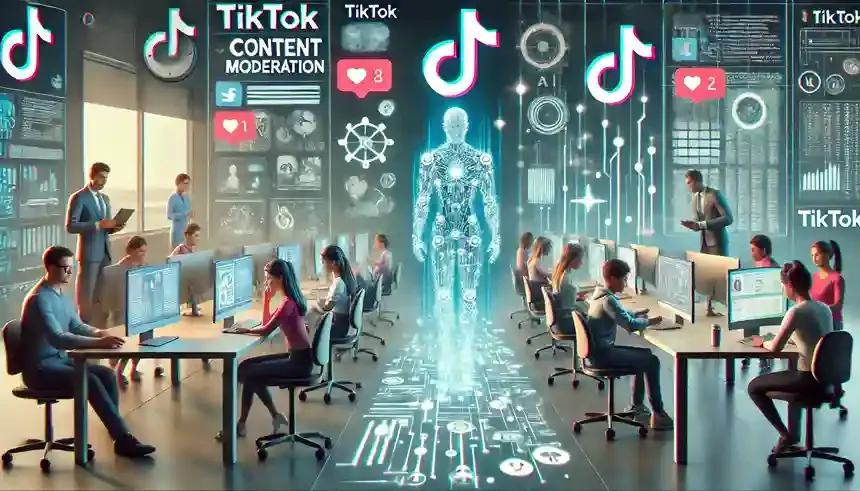TikTok's AI-Driven Content Moderation: Layoffs, Automation, and User Safety Concerns
TikTok is making headlines as it pivots towards AI-driven content moderation, a strategic shift that has resulted in significant layoffs among its human moderation teams. This transition reflects broader trends in the tech industry, where artificial intelligence (AI) is increasingly used to streamline operations and enhance efficiency. However, the shift raises important questions about job security, the effectiveness of AI moderation, and the implications for user safety on social media platforms.
Image by OpenAi's ChatGPT
Why TikTok Is Moving to AI-Driven Content Moderation
TikTok has confirmed the layoff of hundreds of employees, primarily in Malaysia and the UK, as it replaces human moderators with AI systems. Early estimates of job losses had reached 700, but news reports say the tally is closer to 500. This decision is aligned with TikTok's goal of improving its global content moderation model by leveraging advanced AI technology. The company has committed to investing $2 billion in trust and safety initiatives by 2024, with AI serving roughly 80 percent of its moderation tasks.
Why TikTok Is Replacing Human Moderators with AI
Several moving factors contribute to TikTok's decision to switch from human moderators to AI.
Efficiency and Cost Reduction
By automating content moderation, TikTok aims to reduce operational costs while maintaining a high standard of content safety. AI-powered systems allow quicker identification and removal of harmful content, such as nudity and violence, which is essential given TikTok's younger user demographic.
Regulatory Pressures
TikTok is in the hot seat internationally as governments worldwide scrutinize social media platforms for harmful content. The Malaysian government, for example, is asking platforms to improve their monitoring systems to combat the rising tide of cybercrime. AI-based moderation can help TikTok meet these regulatory demands more effectively.
Challenging Working Conditions for Human Moderators
Human moderators have long struggled with grueling conditions - reviewing distressing content under the terrifying tightness of performance targets. According to the law, reviewing videos daily means that moderators in Malaysia, Mexico, and other countries earn as little as $1.80 per hour. These challenges may have influenced TikTok's decision to transition to AI-driven systems.
The Impact of TikTok's AI Moderation on Jobs & User Safety
While TikTok's transition to AI content moderation may enhance operational efficiency, it has several implications for employees and users.
Job Losses and Workforce Restructuring
The layoffs reflect a growing trend in the tech industry, where automation replaces traditional jobs. Content moderators have expressed worries about job security, but unions like the Communication Workers Union have also focused on the fear of job loss due to the return of work to the country of origin. Critics argue that AI enhances efficiency but cannot fully replicate humans' nuanced understanding of content evaluation.
Effectiveness of AI Moderation
While AI systems can process vast amounts of data quickly, their ability to make nuanced decisions remains to be determined. Given context-sensitive issues like a human hand having to look at the context to decide whether or not the content is inappropriate art or whether it is simply inappropriate content, other automated systems may struggle with this. The more that technology versus people becomes the focus of TikTok, the more likely it is that those things are missed or incorrectly classified as harmful content.
User Safety Concerns
TikTok's large user base, especially young individuals aged 10 to 19, makes user safety a top priority. Harmful content spreads rapidly on social media, and TikTok's reliance on AI moderation may not fully safeguard user interests. Maintaining robust community standards while increasing automation remains a critical challenge for the platform.
The Future of TikTok's AI Moderation
As TikTok continues its shift to AI-driven content moderation, several factors will shape its future approach:
Ongoing Investment in AI Technology
TikTok's $2 billion investment in trust and safety initiatives demonstrates a commitment to enhancing its AI capabilities. However, as machine learning algorithms improve over time, the accuracy of identifying and moderating harmful content will also improve.
Balancing Automation with Human Oversight
While automation is essential for handling large volumes of content, the most effective strategy is to combine AI systems with human moderators. A hybrid model that incorporates both AI and human oversight can leverage the strengths of each approach.
Ethical Considerations
As automation becomes more widespread, ethical concerns surrounding job displacement and user safety will emerge. To maintain the balance between technological progress and the human aspect, TikTok must be careful what it does for community standards and a positive working environment for its employees.
Conclusion
TikTok's pivot towards AI-driven content moderation marks a significant shift in its operational strategy. While this transition offers increased efficiency and cost reduction, it raises important questions about job security and the effectiveness of AI moderation. As TikTok evolves, balancing technology with user safety will be crucial for maintaining trust among its diverse user base.
In summary, TikTok's reliance on AI automation reflects broader trends within the tech industry, but it also highlights the complexities of automating content moderation in sensitive areas. To remain, TikTok has to invest in advanced technologies while addressing ethical challenges and providing a safe and creative platform for its users.





